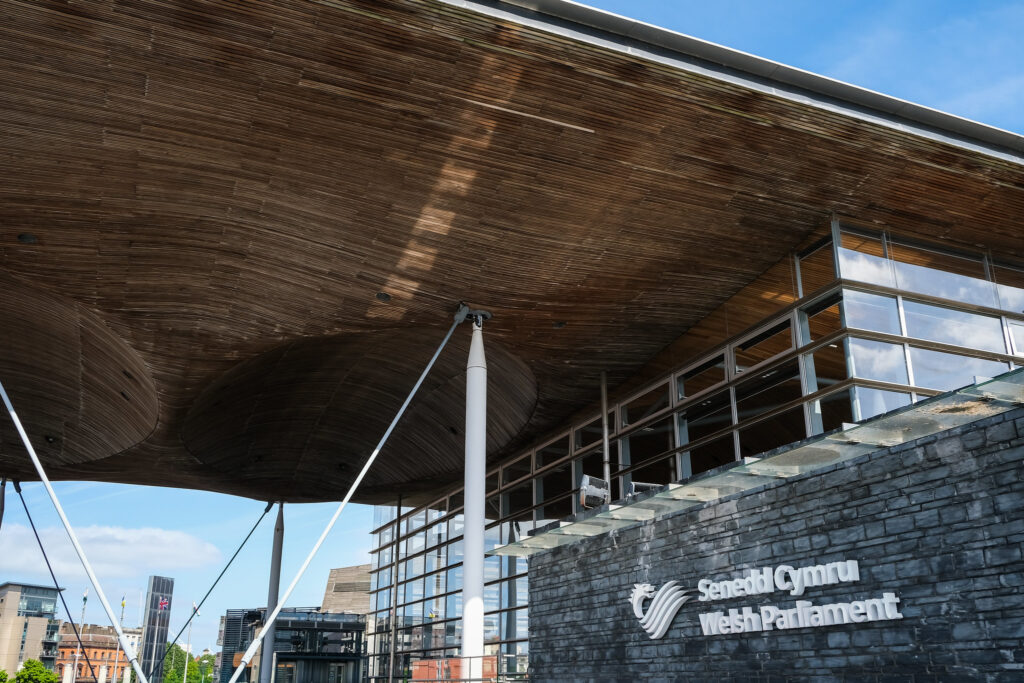Andrew RT Davies looks at the benefits of the union.
On Thursday the 18th September the people of Scotland will have an opportunity to decide the future of the United Kingdom. It is a vote that should stir an interest in everyone from Land’s End to Londonderry, Gower to John O’Groats. Whatever the outcome, the effects will be felt by us all, setting in motion a chain of events that will shape devolution for future generations.
|
This week on Click on Wales This week on Click on Wales we’ve been examining the implications of the Scottish vote on Wales with a series from Welsh party leaders Leanne Wood, Kirsty Williams and Andrew RT Davies. This comes ahead of the IWA’s key conference held this afternoon at the Wales Millennium Centre, which sets out to ask ‘What about Wales?’ This event focused on the effects of the referendum features an exciting lineup including Simon Jenkins, Gerald Holtham, Leanne Wood, Kirsty Williams and David Marquand. Tickets are now sold out, but join the debate on Twitter with the hashtag #IWAReferendum |
The United Kingdom has survived for over 300 years, becoming the most successful political, economic and social union the world has ever seen. Together we have fought Hitler’s fascist forces, developed a parliamentary democracy which has been imitated around the globe, and left a cultural imprint which is the envy of the world. Now the Scottish Nationalist Party want to pull it apart.
But those looking for evidence of why we are ‘better together’ don’t have to look too far…
The NHS was created by a Welshman, the Welfare State by the English, and public service broadcasting in the form of the BBC by a Scot.
Together we have representation on the most powerful decision-making bodies in the world – NATO, the United Nations, the Commonwealth and G7. Together, we represent one of the largest trading markets in the world and speak on world affairs with a clear voice.
Together we are greater than the sum of our parts.
In the modern era, Wales and Scotland have much in common; devolved institutions with real decision-making powers, and a confident sense of national identity.
Together with England and Northern Ireland we form a partnership of independent-minded nations, tightly bonded by shared values and respect for each other’s unique cultural traits.
Alex Salmond’s SNP want to dismantle this shared history. They were founded with this moment in mind.
Salmond sees it as his Bannockburn. For those of us who envisage a shared future there is hope that this Napoleon could be leading his troops to their Waterloo.
The question isn’t whether Scotland could make it on its own, but why she would want to. What can Scotland achieve outside of the union that it cannot from within? And what would the future hold for a smaller, independent nation outside of the collective strength of the UK?
For Wales the implications are no less profound. As Lord Bourne wrote this week – the outcome will affect us all, no matter the result.
Whatever Alex Salmond may claim, the Scottish people are not being asked to choose between independence and the status quo. Even here in Wales, the Wales Bill currently being considered by the House of Lords will change the shape of devolution as we currently know it.
For Scotland, meanwhile, a number of measures are being drawn up by each of the major parties to offer what is termed ‘Devo-Max’ – should the Scottish electorate choose to stay in the United Kingdom. And then there is the English Question.
This is but one strand of a debate that will continue throughout these isles in the coming years, and one which will change the way devolution is administered for each and every constituent part of the UK.
Whilst I don’t want to countenance the idea of a ‘YES’ vote, I have no doubt that the influence of both Wales and the United Kingdom as a whole would be greatly diminished by a Scottish exit. Together with our friends and neighbours in Scotland, Northern Ireland and England we provide much-needed balance to the union – culturally, socially and economically.
Campaign coverage has focused heavily on the economic impact of independence, and unionists have made short work of dismissing Alex Salmond’s economic fantasies – but in the few days which remain that focus must now be on making the case for how we are stronger together.
We must stay positive and remind our Scottish neighbours of our shared history – of our desire for a shared future. The union isn’t just a flag or a name, it’s the way we live. It’s not owned or dominated by one of its constituent parts, but developed in partnership over three centuries of shared interest and values.
Economically, culturally and emotionally the United Kingdom ties us together. Instead of seeking to dismantle it, we should be building firm foundations for another 300 years together.
It’s not for a Welshman to tell the Scottish how to vote but let me be clear, this Welshman very much hopes that you will choose to stay.





I don’t think Mr Davies’ argument is going to convince many undecided Scottish voters to vote NO.
Bringing up the subject of Britain defeating the Nazis in the fifth sentence doesn’t really demonstrate an appreciation of what concerns Scottish voters today.
“The union isn’t just a flag or a name, it’s the way we live”.
Indeed, Andrew RT Davies is correct. The Union is a daily reminder to the people of Wales that they are incorporated into England, with the flag being the prime symbol of suppression. Having been to Scotland in the last week I was amazed by how much fluffy rhetoric and historical inaccuracy has emanated from the No camp. Their message is “better together” because British Nationalism is wonderful. Excuse my scepticism, but seven decades of experience tells me otherwise. If Scotland votes No, the consequences for it, and us, will be profound.
Those of us who love the Union but are forced to watch at a distance are increasingly frustrated by the failure of the ‘No’ Campaign and of the Westminster parties to present a positive and intellectually coherent defence of one of the most successful polities in world history.
The smart money is still on a ‘No’ vote – and the bookies tend to be more reliable than the polls – but, either way, it is going to be closer than it ought to be and that might be the worst result of all. Better a decisive mistake than a long period of uncertainty.
If the ‘Yes’ campaign does prevail, future historians should point to Tuesday as the day that they won it.
The stench of panic in Westminster was so strong that it must have reached all the way to Scotland and the response showed the London ruling class at its most out of touch. Could anything be more counter-productive than bringing Gordon Brown out of his well-earned retirement to present concessions scribbled hastily on the backs of an envelope, the tokenism of the Saltire over downing Street, and sending Cameron, Clegg, and the Lesser Miliband north to calm the rebellious Scots?
No disrespect, but between them these three privileged young metropolitans represent everything wrong with the closed political class which currently dominates London and it should have been obvious that their presence would only remind the Scots of the worst aspect of the United Kingdom, its inane politics.
Their presence on Scottish soil at such a crucial moment will have done more to promote Independence than all the Disneyfied fantasies of the SNP.
Try telling that to the people that are forced to rely on food banks to afford to eat. Try explaining why the UK is the most uneaqual state in Northern Europe in terms of income and wealth distribution. You may well convince yourself that the UK is some beacon of all that is good but the facts dont back that view up. A full one third of Welsh children live in poverty and West Wales and the valleys are the poorest region of the EU. I could go on and on illustrating the shortcomings of the UK but all anyone has to do is take off the rose coloured spectacles and look around at the British state which best serves a privileged elite at the top to the detriment of those at the middle and bottom. That is why Scotland should ignore the doommongers, most of whom are part of the elite mentioned above and vote yes to create the kind of society most of the population can be proud of.
Actually, as with Wellington’s victory over Napoleon at Waterloo which may have been more due to Prussian involvement than Wellington’s generalship, British victory in WW2 would equllynot have been possible without the involvement of others: the USA forces, US material support before their call to arms, the presence of thousands of Empire troops in the conflict and especially the huge sacrifice made by the people and armed forces of the then Soviet Union upon whose shoulders th mantle of ‘Victory’ really resides. Add to that the defence of this ‘realm’ enjoined by polish, French and other European ‘foreign nationals’ and maybe, who knows, the story may have been very different. As far as flags are concerned then the very absence of any Welsh symbolism represents the truth as Westminster has always seen it that Wales has been incorporated into England as part of the Anglo-Saxon/Norman country whose ruling elite have consistently seen to it that unique Welsh institutions and cultural expressions, save those that attract tourists, are demeaned and eliminated but not entirely with success which is not testimony to the ‘Union’ but glorifies Welsh resilience in the face of the overwhelming cultural, economic and military forces ranged against her by the ‘Union’. Indeed, if we are emotionally tied together in this Union why is it that almost nowhere in Wales will visitors find the Union flag fluttering whilst the Red Dragon is everywhere to be seen fluttering proudly alongside, often, her sister banners of St. David and Owain Glyndwr. External expressions perhaps of internal reality that alongside Scotland, where the Saltire flies triumphant, and Cornwall where the Black and white banner adorns every pole from which it is possible for it to be flown, our attachments are being expressed in ways only those tied to the Union cannot recognise or just will not see. Let us be clear: Blair introduced devolution as a sop to cut off the nationalist attack at its very root but unintentionally he let the genie out of the bottle and long held pent up frustrations spilled out everywhere most graphically in Scotland but also in a more cautious Wales where resentment at the inequality of devolution felt to many like an insult and reduction of the importance within the Union of Wales. It is also important to remember that this parliamentary democracy of which so many are so proud has also imposed the most draconian and undemocratic decisions upon powerless communities: Tryweryn remains under the waters to remind us how innocent people lost their homes to assuage the thirsts of Liverpool folk. and much of our small country is under military control. Given that Wales is one of the poorest areas of Europe and her fiscal status no different, in that sense, than what it was pre-devolution then the Union has hardly proved a strength to Wales has it?
Has the UK really ‘survived for 300 years’? That statement ignores the facts, namely the departure of the Irish Free State in 1921. Scottish independence would continue the process of decolonisation. The end of the British Empire has meant the centralised UK state is well past its sell-by date. So get over it, and welcome the advent of a new self=governing country, if not now in the next decade or so.